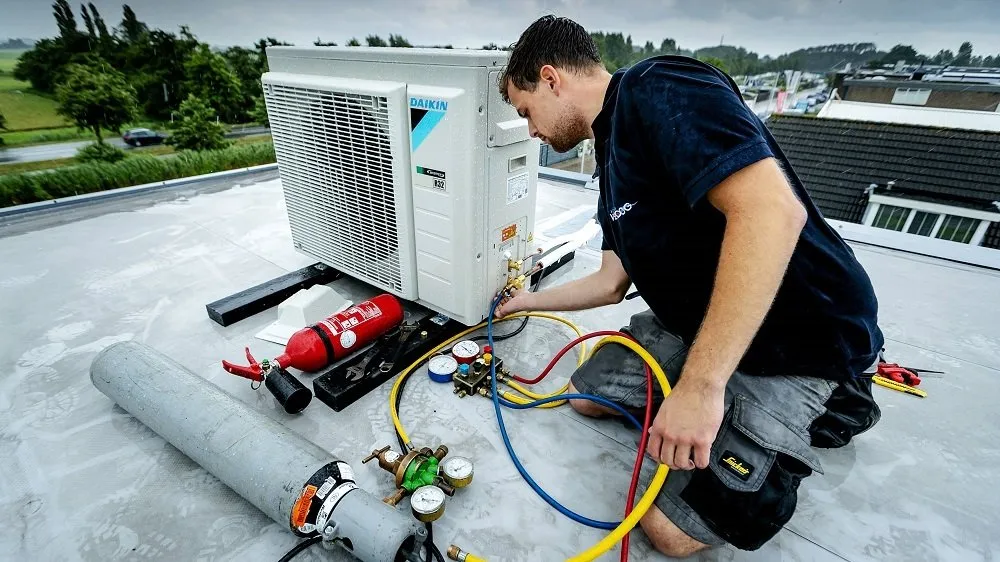In the warm and humid climate of Safety Harbor, FL, air conditioning isn’t just about comfort—it’s a necessity. With residents relying on their AC units daily, ensuring proper maintenance and safety measures is essential for both personal well-being and the community’s collective safety.
Nestled on the western shore of Tampa Bay, Safety Harbor is a vibrant community that thrives under the Floridian sun. However, the intense heat and humidity make air conditioning more than a luxury—it’s a crucial part of everyday life. Understanding and prioritizing AC repair safety can help residents protect their homes, health, and quality of life.
Life’s Hard. Comfort’s Not. Hire Our AC and Heating Services Today!
Understanding AC Safety Risks in Safety Harbor, FL
Like any location, Safety Harbor faces specific AC-related risks. With constant use, AC systems can develop issues that pose safety hazards. Being aware of these risks allows homeowners to take proactive steps to protect their families and properties.
1. Electrical Hazards
Safety Harbor experiences frequent electrical storms, making power surges and lightning strikes a significant risk. Proper grounding and surge protection can help safeguard your AC unit from electrical malfunctions that could lead to fires or system failures.
2. Refrigerant Leaks & Environmental Concerns
Safety Harbor is committed to environmental conservation, making refrigerant safety a top priority. Leaks not only affect your AC’s performance but can also harm the environment. Understanding proper refrigerant handling and disposal helps keep both your home and the ecosystem safe.
3. Indoor Air Quality Issues
A neglected AC unit can circulate dust, mold, and allergens, compromising indoor air quality. Regular maintenance ensures cleaner air and a healthier living space for you and your family.
4. Fire Risks
Faulty wiring, overheating components, and lack of maintenance can turn an AC unit into a fire hazard. Regular inspections and adherence to safety guidelines significantly reduce the risk of AC-related fires in residential areas.
By addressing these risks, residents can enhance the longevity of their AC units and contribute to a safer community.
The MECE Approach to AC Repair Safety
The MECE (Mutually Exclusive, Collectively Exhaustive) framework ensures a well-organized and thorough approach to AC repair safety, covering every critical aspect without redundancy.
Mutually Exclusive Strategies (Specific Safety Measures)
- Electrical Safety Measures – Guidelines to prevent electrical hazards and ensure safe AC operation.
- Proper Refrigerant Handling – Steps to safely manage and dispose of refrigerants while complying with environmental standards.
- Indoor Air Quality Management – Best practices for keeping your AC system clean and maintaining optimal air quality.
- Fire Prevention Tactics – Strategies to reduce the risk of AC-related fires through proper maintenance and safety protocols.
Collectively Exhaustive Practices (Comprehensive Coverage)
- Routine System Inspections – Regular checks to identify potential issues before they become major problems.
- Scheduled Maintenance – Both professional and DIY maintenance practices to keep your AC running efficiently.
This structured approach ensures clear, actionable steps to enhance AC safety in Safety Harbor homes.
The Dangers of Neglecting AC Safety
1. Health Risks
- Respiratory Issues – Poorly maintained AC units can circulate dust and mold, aggravating asthma and allergies.
- Allergies & Irritations – Dirty filters and ducts can trigger allergic reactions, leading to discomfort and health concerns.
2. Property Damage
- Fire Hazards – Electrical malfunctions in neglected AC units can cause fires.
- Structural Damage – Leaks and poor drainage can lead to water damage and mold growth, compromising your home’s integrity.
Taking proactive measures ensures both your health and the safety of your property.
The Role of Personal Protective Equipment (PPE) in AC Repairs
Using Personal Protective Equipment (PPE) is crucial for safe AC maintenance, protecting against electrical hazards, refrigerant exposure, and physical injuries.
Essential PPE for AC Repairs:
🦺 Eye & Face Protection – Goggles or face shields prevent debris and chemical splashes.
🛑 Hand Protection – Insulated gloves shield against electrical shocks and refrigerant exposure.
😷 Respiratory Protection – Masks or respirators prevent inhalation of dust, mold, and fumes.
👞 Proper Footwear – Non-conductive, slip-resistant shoes ensure stability and electrical safety.
👕 Body Protection – Coveralls protect against dirt, refrigerants, and sharp components.
For DIY repairs, homeowners should also use basic PPE to minimize risks.
Life’s Hard. Comfort’s Not. Hire Our AC and Heating Services Today!
Regulatory Compliance in AC Repairs
Following industry regulations ensures safe and efficient AC repair. Key compliance areas include:
- Licensing & Certification – Technicians must hold proper credentials.
- Code Compliance – AC installations must meet safety and building code standards.
- Environmental Regulations – Proper refrigerant disposal prevents environmental harm.
- OSHA Guidelines – Safety measures protect technicians and homeowners.
Consequences of Non-Compliance:
❌ Fines & Penalties – Violating regulations can result in costly fines.
❌ Legal Liability – Negligence in AC repairs may lead to lawsuits.
❌ Loss of License – HVAC professionals risk losing their certification.
❌ Reputation Damage – Non-compliance can harm business credibility.
Ensuring compliance not only enhances safety but also builds trust in the HVAC industry.
Prioritizing AC repair safety protects your home, health, and community. Don’t wait—schedule regular maintenance and keep your system running safely and efficiently!

